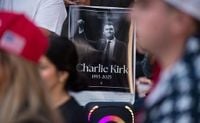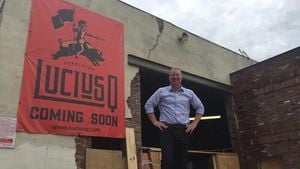The nation has been roiled by shock, outrage, and deepening divisions following the fatal shooting of conservative activist Charlie Kirk at Utah Valley University on September 10, 2025. The aftermath has reverberated far beyond the immediate tragedy, sparking a wave of public condemnation, workplace firings, and renewed debate over the boundaries of free speech and political discourse across the United States.
Charlie Kirk, just 31 years old, was known nationwide for founding Turning Point USA, a group that galvanized conservative activism on college campuses. His sudden and violent death while speaking at a university event has left supporters and critics alike grappling with the implications for American democracy and civil society. According to CNN, footage captured a person matching the suspect’s description walking down a street before the shooting, and a Utah Valley student reported seeing a man on or near the roof of the Losee Center in the weeks prior, describing the behavior as “weird.”
As news of the assassination spread, the political and media world reacted with a mixture of grief, anger, and, in some corners, troubling displays of partisanship. Seth Meyers, host of NBC’s Late Night, opened his September 11 broadcast with a somber address: “We’re horrified by this grotesque tragedy, and our condolences go out to his family and loved ones. It should never be a matter of political ideology to mourn and to extend our fullest and deepest empathy to those who are suffering. Political violence is abhorrent and anathema to the highest ideals of this country. It corrodes us and threatens the very foundations of our democracy.” Meyers called for “dignity and compassion” from all leaders, especially President Donald Trump, and urged the country to reject violence as a means of resolving political differences.
Yet, the aftermath has been anything but calm. According to TIME, a Cincinnati restaurant, Lucius Q, became a flashpoint after its owner, Aaron Sharpe, posted a comment deemed offensive about Kirk’s killing on his personal social media. The backlash was swift and overwhelming: more than 4,000 people criticized the restaurant’s X account, its Google reviews page was inundated with one-star ratings, and the voicemail box was full within hours. By the evening of September 11, Lucius Q announced on Facebook that Sharpe was no longer associated with the business, stating, “We found the comments he made on his personal social media pages offensive and, as a result, have severed ties with him.” The home of FC Cincinnati, TQL Stadium, also terminated its relationship with the restaurant, with stadium officials emphasizing an expectation for “vendors and partners to uphold the values of respect and tolerance.”
This incident was not isolated. Across the country, individuals faced disciplinary actions—including firings and suspensions—for comments made about Kirk’s death. MSNBC political analyst Matthew Dowd lost his job after making remarks that appeared to blame Kirk for creating the conditions of his own killing, saying, “Kirk has been one of the most divisive, especially divisive younger figures in this, who is constantly sort of pushing this sort of hate speech or sort of aimed at certain groups. And I always go back to, hateful thoughts lead to hateful words, which then lead to hateful actions. And I think that is the environment we are in.” MSNBC’s president Rebecca Kutler called his comments “inappropriate, insensitive and unacceptable,” and Dowd himself issued an apology before his dismissal.
The ripple effects extended into academia and media. The University of Mississippi and Middle Tennessee State University both fired staff members for making insensitive remarks about Kirk’s death. In Tennessee, Republican Senator Marsha Blackburn called for the removal of an assistant dean who reportedly posted that they had “ZERO sympathy” after the shooting. DC Comics also entered the fray, firing one of its writers and cancelling their series after the writer posted comments about the shooting; the company stated, “Posts or public comments that can be viewed as promoting hostility or violence are inconsistent with DC’s standards of conduct,” according to CNN.
Social media became a battleground for both sides. An anonymously registered website, “Expose Charlie’s Murderers,” began publishing names, locations, and employers of individuals allegedly supporting political violence online. Far-right influencer Laura Loomer posted, “I will be spending my night making everyone I find online who celebrates his death Famous, so prepare to have your whole future professional aspirations ruined if you are sick enough to celebrate his death.” Conservative activist Scott Presler used his platform to solicit tips on teachers celebrating Kirk’s death, sharing posts and profiles of alleged offenders.
Florida’s education commissioner Anastasios Kamoutsas issued a stern warning to teachers, stating in a memo posted on X, “I will be conducting an investigation of every educator who engages in this vile, sanctionable behavior. Govern yourselves accordingly.” Even journalists were not immune: a reporter for Floridapolitics.com was suspended after asking a Republican lawmaker about gun control immediately following the shooting, and a sports journalist for Arizona’s PHNX Sports was fired after posts critical of Kirk’s positions on gun violence and rhetoric.
The federal government responded with its own measures. On September 11, Deputy Secretary of State Christopher Landau announced, “In light of yesterday’s horrific assassination of a leading political figure, I want to underscore that foreigners who glorify violence and hatred are not welcome visitors to our country. I have been disgusted to see some on social media praising, rationalizing, or making light of the event, and have directed our consular officials to undertake appropriate action.” The Trump Administration expanded its policy of vetting visa applicants’ social media for posts related to Kirk’s death, part of a broader crackdown on ideological and political grounds. Secretary of State Marco Rubio stated earlier in the year, “Free speech is among the most cherished rights we enjoy as Americans. This right, legally enshrined in our constitution, has set us apart as a beacon of freedom around the world. We will not tolerate encroachments upon American sovereignty, especially when such encroachments undermine the exercise of our fundamental right to free speech.”
Meanwhile, the debate over gun violence and political extremism has intensified. Seth Meyers, in his commentary, highlighted that there have already been over 300 mass shootings and 47 school shootings in 2025 alone. He referenced a string of politically motivated attacks in recent years, underscoring the urgency of enacting reasonable gun safety laws and restoring civility to public life. “No matter the identity or ideology of these perpetrators, one thing is always constant, the guns,” Meyers said. “We must make it possible for children to go to school and for everyone to engage in public debate without the threat of gun violence looming over them.”
The killing of Charlie Kirk has become a flashpoint in America’s ongoing struggle to balance free speech, public safety, and political expression. As the country mourns another high-profile victim of violence, the calls for greater empathy, accountability, and reform grow louder—yet so too does the clamor of division and recrimination. The nation stands at a crossroads, with its leaders and citizens alike facing hard questions about the future of its democracy and the values it chooses to uphold.





